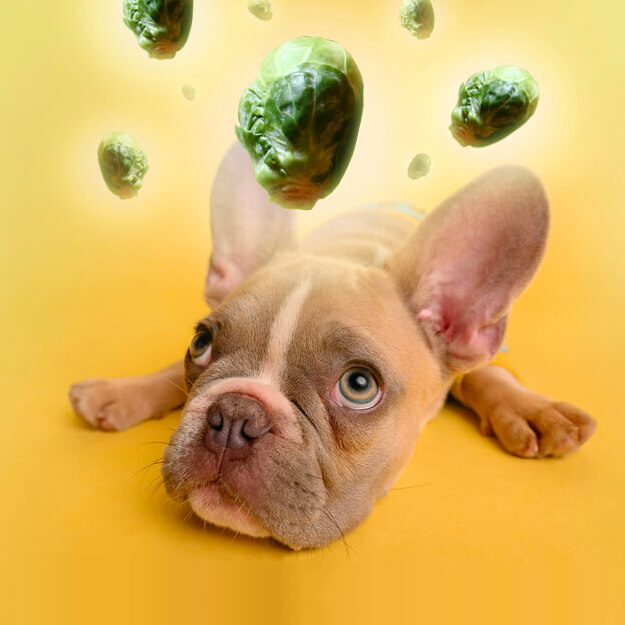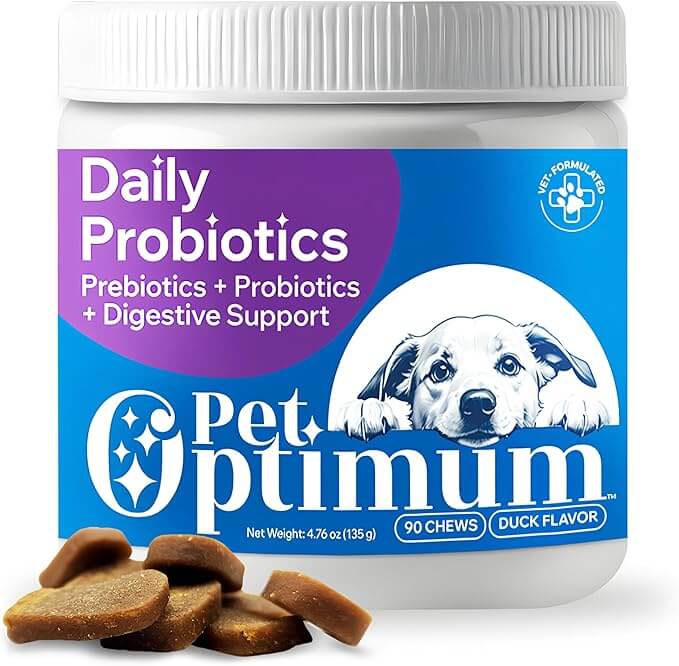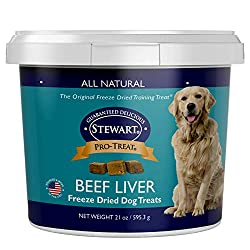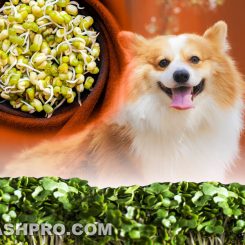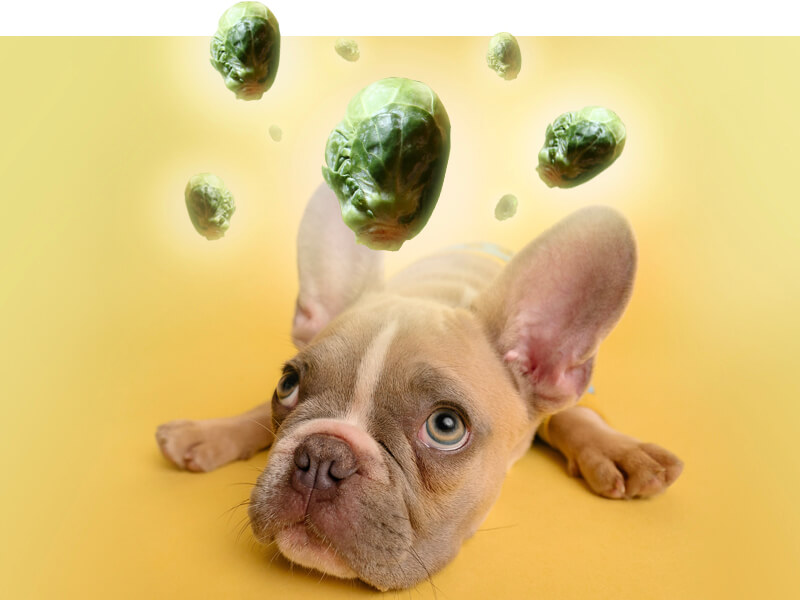
Can Dogs Eat Brussel Sprouts? Yes, dogs can eat Brussel sprouts as they are rich in fiber, loaded with key vitamins, and contain vital minerals. Consuming a moderate amount is key since too much can cause gastrointestinal issues and flatulence.
When I’m in the kitchen preparing and steaming Brussel sprouts, my hungry dogs run in to watch my every move. Similar to dairy products such as sour cream and milk, Brussel sprouts can cause bloating and gas so I’m careful to not give my dogs too much.
Brussel sprouts when given in moderation can make a tasty and nutritious snack for your pooch. Below we cover important tips for all canine owners, including the proper ways to prepare and feed Brussel sprouts to your dogs. We also cover which part of a sprout is safe (and dangerous) for their consumption and health.
Table of Contents
Are Brussel sprouts good for dogs?
According to the American Kennel Club (AKC), it is absolutely safe to feed your dogs a moderate amount of Brussel sprouts.
But are Brussel sprouts good for your furry friends? Do they bring health benefits?
When dogs consume a moderate amount of Brussel sprouts, they receive many health benefits. Consuming this cruciferous vegetable helps build strong bones, protect the heart, reduce inflammation, and improve blood circulation.
Unquestionably, Brussel sprouts are packed with essential nutrients that can improve a dog’s health. They are filled with fiber, contain key vitamins and minerals, and high in antioxidants.
However, keep in mind that Brussel sprouts should never be a major part of a healthy dog diet. They are a great supplement to an existing diet such as homemade dog food or raw diet. If your dog is already eating a whole and complete meal, supplementing with Brussel sprouts is not necessary.
It’s best to start by adding a very small amount to his normal food and gradually increase to a moderate amount.
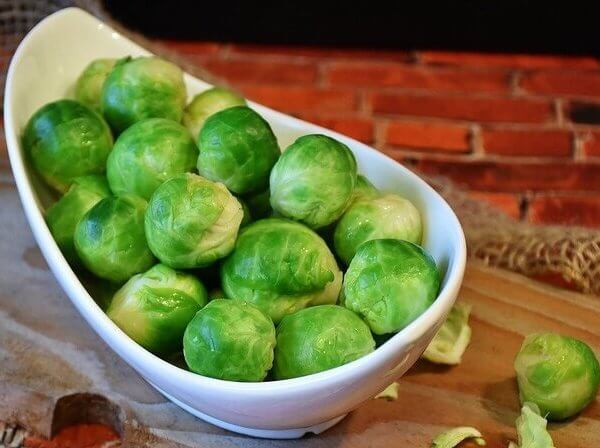
1. Insoluble fiber
Brussel sprouts are rich in fiber, which supports digestive health and promotes regularity. All dogs can benefit from insoluble dietary fiber. A moderate amount of fiber regulates their digestive functions.
Insoluble fiber attracts water into your dogs’ stool, making it softer and easier to pass with less strain on his bowel. Thus, insoluble fiber aids in elimination functions and maintains both bowel and gut health.
For a consistent source of fiber that supports gut health without the side effects of certain vegetables, consider supplementing with PetOptimum Probiotics for Dogs. These probiotics can support digestive health naturally, helping your dog feel their best.
Fun Fact: Goji Berries are a superfood that’s also low in calories, high in fiber, and rich in antioxidants.
2. Vitamins: B1, B6, K, A, C and E
This cruciferous vegetable is packed with essential vitamins that will boost your dogs’ bone health and keep them active. We will go over each vitamin this vegetable contains.
Sprouts contain a small amount of Vitamin B1 or thiamine, which helps the dog’s body process food (carbohydrates) to produce energy. B1 metabolizes fats and protein and activates ion channels in neural tissues.
Another B vitamin that is vital is Vitamin B6 or pyridoxine. It helps improve your dog’s mood, promote healthy brain function, produce red blood cells, and maintain a potassium-sodium balance in your dog’s body. Some dog breeds are prone to Cushing’s disease. This nutrient guard against this disease.
Both B1 and B6 helps the nervous system function properly. These two vitamins provide your dog with a healthy liver, skin, hair, and eyes.
Packed full of Vitamin K, Brussel sprouts provides your dog with strong bones. Vitamin K is also important for blood clotting function.
Next is Vitamin A, which is responsible for keeping your pup’s muscle, vision, cells, lungs, and heart functioning properly. Vitamin A also helps with immune functions and the nervous system. Lastly, this nutrient also improves your dog’s skin and coat.
Be aware that consuming too much Vitamin A is deadly. VCA Hospitals noted that Vitamin A toxicity is usually found in dogs who are fed table scraps. In addition, eating too much organ meat like liver or supplements with cod liver oil can cause Vitamin A toxicity.
The Vitamin E in this delicious vegetable helps fight against damage free radicals and protect the cells. Essentially, Vitamin E is an antioxidant, which is great for our canine friends.
Lastly, Brussel sprouts contain Vitamin C. Vitamin C help reduces inflammation and cognitive aging. This nutrient also neutralizes harmful free radicals in the body and guard against cell damage.
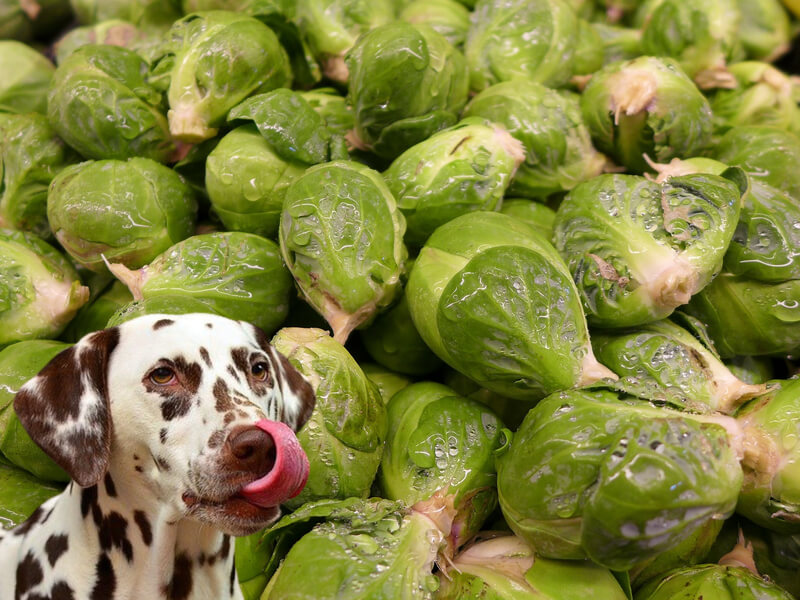
3. Vital minerals: Potassium and Manganese
In addition to the five essential vitamins, Brussel sprouts contain two vital minerals that are important to a dog’s health. Minerals help with many bodily functions such as helping your dog’s skin, bones, heart, and muscles.
The first is a macro-mineral called Potassium. Large amounts of Potassium are needed for a dog’s body to function properly and maintain a proper fluid balance in dogs. Potassium works at a cellular level to keep a healthy balance of pressure with sodium and create energy.
Potassium is also an electrolyte that provides your dog with strong muscles and helps with heart function, nervous system, and both brain and enzyme function.
The second vital mineral is Manganese. Manganese is a nutrient that metabolizes protein, carbohydrates, and amino acids. This nutrient helps maintain healthy bones and cartilages in joints and helps your dog’s body create energy.
Fun Fact: Edamame contains 436mg of potassium in a 100g serving.
4. High in Antioxidants
The antioxidant-rich sprouts protect against cell damage caused by free radicals, cancer, and disease. Free radicals are molecules found in cigarette smoke, sunlight, and pollution. They’re even in the end product of our own breathing!
Antioxidants also neutralize the effects of chronic inflammation to keep your dog healthy. They can be found in the skin of apples, carrots, and berries. The most common antioxidants are beta carotene, selenium, and lycopene.
If your dog hates Brussel sprouts, there are plenty of fruits and vegetables that are high in antioxidants. The Care Animal Hospital provides a list of food that contains antioxidants:
Calories in Brussel sprouts
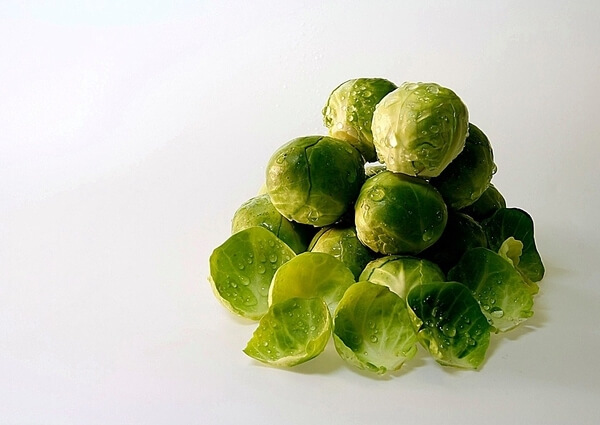
It’s evident that Brussel sprouts are safe for dogs to eat. But be mindful of how much sprouts you’re supplementing into your dog’s food.
For food that hasn’t yet been recommended by my veterinarian, I use the 90/10 rule for my Chihuahua. 90% of the daily calories come from her regular food while 10% come from snacks.
I consider Brussel sprouts to be a snack because they aren’t meant to be served as the main part of a meal. Rather, they are a great supplement to an existing diet.
Since most dogs need to eat between 25 and 30 calories for every pound of body weight, here are the calories for two average adult dogs.
- A Chihuahua of 10 pounds should eat between 250 and 300 calories per day.
- A Labrador Retriever of 75 pounds should eat between 1,875 and 2,250 calories per day.
Next, I calculated how many calories are in the raw or roasted Brussel sprouts. I found out what percentage of the total calories is from Brussel sprouts if I add them to my dog’s daily diet. Here’s my finding:
- 5 Raw Brussel sprouts (22 calories): 7% Chihuahua / 1% Labrador Retriever daily intake.
- 5 Roasted Brussel sprouts (34 calories): 11% Chihuahua / 2% Labrador Retriever daily intake.
Both raw and roasted Brussel sprouts are very low in calories. For a small Chihuahua, a portion of 5 sprouts would only account for between 7% to 11% of her daily diet.
Although 5 sprouts seem little, I wouldn’t recommend feeding this many to your pooch. If this is your dog’s first time having sprouts, give her 1/2-to-1 sprout depending on her size. If everything is fine, give her no more than three per serving occasionally.
Can dogs eat Brussel sprouts daily?
I would not recommend serving sprouts every day and will explain in more detail below.
Fun Fact: Similar to Brussel sprouts, Okra has many nutritional benefits too. Okra is packed full of protein, vitamins, minerals, fiber, and antioxidants.
Can Brussel sprouts help with dog weight loss?
Since sprouts are low in calories, can they help with dog weight loss?
Brussel sprouts are packed with nutrients and are high in fiber while low in calories. A little bit of Brussel sprouts to supplement their existing food could help them feel full without increasing their calorie intake.
Can dogs eat raw Brussel sprouts?
Feeding your dog raw sprouts sounds like a good idea since they are fewer in calories than roasted sprouts. But we do want to warn you of one by-product of raw sprouts.
The foul gas. And lots of it!
Brussel sprouts are leafy vegetables that look like miniature cabbages. They belong to the cruciferous vegetable family. Similar to sprouts, cabbages have many health benefits, but they also create flatulence if consumed too much.
The American Kennel Club (AKC) noted that sprouts contain isothiocyanate. While isothiocyanate helps the intestinal muscle push food and waste through the gastrointestinal tract.
This extra help from isothiocyanate comes at a cost. Stinky dog farts.
The excess bacterium from this substance has to leave your dog’s body as gas. No wonder my living room smells so bad every time I add sprouts to my Chihuahua’s meal.
Now I think twice about adding sprouts to my dog’s food, especially when they are raw.
Handy Hint: When we are considering our furry friend’s diet, be sure to stay away from processed junk food like Cheese Balls as this junk food could cause weight gain and upset stomachs.
Can dogs eat cooked Brussel sprouts?
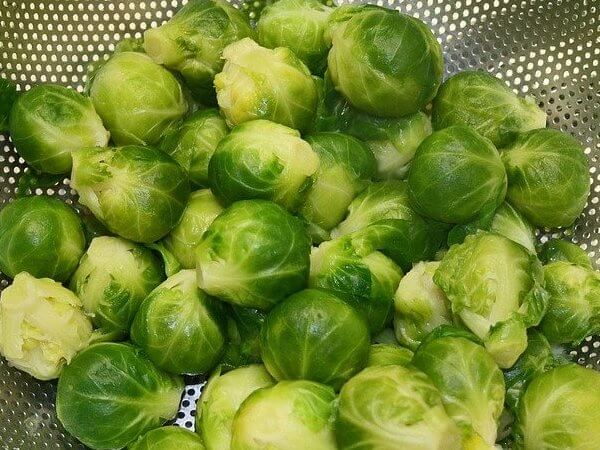
Cooked Brussel sprouts are just as good as raw sprouts. I usually cook the sprouts before giving them to my four-legged friend. It’s easier for her to digest.
When Brussel sprouts are raw, they are very hard. My 10 pound Chihuahua, no matter how tough she thinks she is, will not be able to digest it.
Although she’ll still pass gas, it’s not as much or deadly. Imagine her eating a raw one! It will be unbearable.
As mentioned above, do not feed sprouts to your furry friend every day. Eating sprouts daily can lead to serious health problems. Consuming a high amount of Brussel sprouts can disrupt your dog’s gastrointestinal tract.
I had to experience this myself with my Chihuahua.
I was preparing for a family gathering dinner and was missing a few ingredients. Before leaving the house, I left a bowl of raw sprouts on the kitchen counter, ready to be roasted once I arrive home.
One of the dishes on the menu was roasted Brussel sprouts paired with chopped up bacon. I had to run and grab bacon. When I came home, the bowl was toppled over and Brussel sprouts were all over the counter.
Not only that, a sudden wave of rotten egg smell brushed upon my face. I had to leave the front door open. That night, she kept passing gas and had diarrhea.
I’m not sure who was more miserable after this experience – her or me. I did feel very guilty for not being careful and leaving the raw sprouts on the counter. I should’ve kept the raw Brussel sprouts away from her in the fridge!
Can dogs eat Brussel sprout stalks?
Raw Brussel sprout stalks are not safe for dogs to eat. The tough unpeeled stalks have a thick outer casing that is fibrous. If you have small dogs, keep unpeeled sprout stalks away from them. A small dog trying to eat the raw stalk may risk choking, perforation, and even impaction.
However, the stem on the inside is safe and edible. Be sure to peel off the outer stalk and steam it. Your dog will enjoy it!
Can dogs eat Brussel sprout leaves?
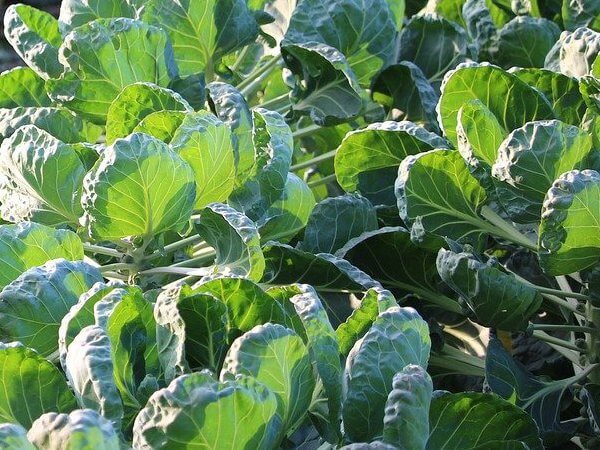
How about Brussel sprout leaves? Can dogs eat Brussel Sprout leaves?
Yes, Brussel sprout leaves are safe for your dogs to eat. Your dog is unlikely to pass as much gas eating raw leaves as when they eat whole raw sprouts.
It’s best to steam the Brussel sprout leaves before adding them as garnish over your dog’s regular food.
Can dogs eat frozen Brussel sprouts?
It depends. If the Brussel sprouts are frozen and haven’t been out to thaw for a few minutes, it can be a choking hazard to your pup. The frozen sprouts are hard to chew and sharp from the ice.
I would not feed my dog frozen sprouts. However, if I buy frozen sprouts and plan to steam them, then yes, it’s safe for my Chihuahua because she’ll be eating cooked sprouts with her regular food.
I do not recommend giving your pups frozen Brussel sprouts as treats. There is plenty of dog treats available. I give my Labrador freeze-dried liver treats and she goes crazy for it!
Additional feeding information
Depending on your dog breeds, they may or may not struggle with digesting Brussel sprouts. It’s best to start by giving them 1/2 sprout and see how they react.
Before cooking this vegetable, make sure to remove the nubby, hard stem from the sprouts. If your pooch accidentally eats the stem, it can be a choking hazard or may even get lodge in their intestine or throat.
When you’re cooking the sprouts, avoid adding anything that would upset your dog’s stomach such as salt, pepper, lemon juice, butter, or oil. Keep the sprouts clean and natural is best.
I always steam the Brussel sprouts before giving them to my dogs. I only give them a few once a week.
Steaming the Brussel sprouts is best because you’re preserving the nutrient and antioxidant properties. It’s also easier for your four-legged friends to digest the sprouts.
Avoid overcooking the Brussel sprouts. Overcooked Brussel sprouts lose their nutritional value and benefits.
I mentioned above that I was making Brussel sprouts with chopped bacons. Please note that dish was only for human consumption. Avoid giving your dogs bacon as it is too salty for them. Avoid bacon completely.
In addition to bacon, do not add onion, garlic, vinegar, pepper, salt, or butter to the Brussel sprouts if you’re serving them to your pups.
Both onion and garlic are very toxic to dogs. Too much salt can cause sodium toxicity in dogs. Butter is also harmful to dogs that are lactose-intolerant. Keep all of these away from dogs. It’s best to eat Brussel sprouts in their natural and plain form.
I do want to let you know that you should avoid boiling the sprouts. Avoid boiling at all costs. Boiling the sprouts removes the healthy nutrients and the cancer-fighting antioxidant properties.
So, can dogs eat Brussel sprouts?
Whenever I’m in the kitchen chopping and steaming the Brussel sprouts, my Chihuahua Lily makes her appearance and sits next to her doggie bowl. She waits until the sprouts are ready.
Moderation is key so I’ll only give her 1/2 or less of the sprout. Make sure to check with your vet first if it’s ok to feed your dog Brussel sprouts. Your dog’s vet will also recommend how many you can give your pup.
Remember every dog is different and unique. Each dog has its specific nutritional needs.
Related Questions
No, Brussel sprouts will not harm dogs. Be sure to feed your dogs cooked Brussel sprouts and in a moderate amount. This vegetable provides many health benefits since it contains fiber, vitamins, vital minerals, and is high in antioxidants.
If your pooch ate too much Brussel sprouts and is experiencing symptoms such as vomiting or diarrhea, be sure to contact your veterinarian right away as these symptoms warrant immediate attention.
Your dog may love Brussels sprouts because they are crunchy and have an attractive odor. Your pooch may like the different tastes Brussel sprouts provides. Since this small cabbage vegetable provides health benefits, your pooch may be craving it to satisfy their vitamins or minerals intake.
Raw Brussel sprouts will make dogs farts because they contain a chemical called isothiocyanate. While isothiocyanate does help the dog’s digestive system, it also comes at the price of stinky dog farts.
Vegetables that are bad for dogs include unripe tomatoes, garlic, onions, mushrooms, and asparagus.
When it comes to vegetables, stick to ones that are safe for dogs to eat such as Brussel sprouts, carrots, broccoli, green beans, peas, and spinach.
Yes, it is okay to give a dog Brussel sprouts, however, the key here is to give them to your dog in moderation. Giving your pooch too many Brussel sprouts and your pup can start to experience diarrhea and an upset stomach. Be sure to give your furry family member the right amount per the guidance above to prevent flatulence in dogs.
While farts may send you running, it is not dangerous to your dog.
DISCLAIMER: THIS WEBSITE DOES NOT PROVIDE MEDICAL ADVICE
The information, including but not limited to, text, graphics, images and other material contained on this website are for informational purposes only. No material on this site is intended to be a substitute for professional veterinary advice, diagnosis, or treatment. Always seek the advice of your veterinarian or other qualified health care provider with any questions you may have regarding dietary needs.
Resources:
https://vcahospitals.com/know-your-pet/vitamin-a-toxicosis-in-dogs
https://www.careah.com/post/importance-of-antioxidants-in-dog-food/

With over five years of specialized experience as an animal writer, my expertise lies in dog nutrition, health, behavior, grooming, and training. I am dedicated to delivering helpful and informative content that caters to the well-being of our furry friends. My primary goal is to empower pet owners with knowledge and ensure our canine companions thrive in health and happiness. In my free time, I love volunteering at local dog rescue centers.
